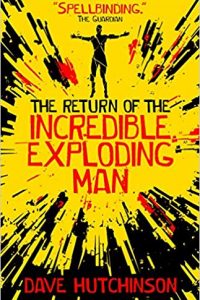Ian Mond Reviews Lanny by Max Porter
 Lanny, Max Porter (Faber & Faber 978-0571340286, £12.99, 224pp, hc) March 2019. (Graywolf 978-1555978402, $24.00, 160pp, hc) May 2019.
Lanny, Max Porter (Faber & Faber 978-0571340286, £12.99, 224pp, hc) March 2019. (Graywolf 978-1555978402, $24.00, 160pp, hc) May 2019.
I picked up Max Porter’s debut, Grief Is the Thing with Feathers, when it was nominated for The Goldsmiths Prize back in 2015. It was unlike anything I’d ever read, a glorious, experimental fusion of poetry and prose, capturing the raw, jagged emotions of a father and his two sons mourning the unexpected death of their wife and mother, and the keen observations of a crow, an embodiment of death inspired by the poetry of Ted Hughes. Lanny is Porter’s highly anticipated follow-up, a novel that is superficially similar to Grief Is the Thing with Feathers – compact length, an intimate focus on a family, the presence of a mystical creature (a Green Man rather than a crow) – but is far more ambitious in terms of the storytelling and the themes Porter tackles.
Lanny opens with Dead Papa Toothwort, Porter’s take on the Green Man, waking from a nap, “hungry for his listening.” Moving at the “speed of dusk” he arrives at the village and revels in the voices of the residents, fragments of conversation that are literally scattered across the page. Dead Papa Toothwort centres on his favourite voice, that of Lanny, a boy “young and ancient all at once” with a vibrant imagination. Lanny and his parents – Jolie and Robert – have recently moved to the village, 100 kilometres outside of London. Robert is “a city slicker who wouldn’t know a cow from a boar” and Jolie is a bit actor on the telly now writing an ultra-violent thriller which she keeps from Lanny’s prying eyes. Both parents have niggling concerns about their son: his quixotic behaviour, his flights of fancy, his belief there’s a girl living under a tree. When Jolie notices that Lanny has taken a shine to a famous local artist named Pete – known to some in the community as “Mad Pete” for his unconventional installations – she asks him if he will teach Lanny art. Pete agrees to spend time with the boy, to encourage his artistic sensibilities, and together they form a strong bond. In the meantime, Dead Papa Toothwort, mythic and elemental, patient but quick to anger, continues to listen to the villagers, continues to piece together their stories, and most of all he continues to keep watch over Lanny.
If Grief Is the Thing With Feathers was a meditation on death and mourning, then Lanny is a paean to the English village. When Dead Papa Toothwort wakes up, scraping off “dream dregs of bitumen glistening thick with liquid globs of litter,” and vomits up “a plastic pot and a petrified condom,” I thought the novel was going to portray the last gasp of village life, the intrusion of the city, the decay and rot of progress, but Porter is far more nuanced than that. Like Jon McGregor’s astonishing 2017 novel Reservoir 13, which also deals with the disappearance of a child, Porter acknowledges that village life is insular, prone to gossip and vicious rumour, a knee-jerk desire to turn on those who’ve come from the outside, like Robert and Jolie, or be wary of those who don’t comply with the norm like Mad Pete and Lanny. But there is a beauty to the village as well, not just the land but in its resilience, a primal capacity to survive the repetitive, often violent phases of history. As Dead Papa Toothwort tells us:
[He] has seen… men beat each other senseless, seen bodies abused and violated, seen people hurt their closest, harm themselves, plot and worry or panic and rage, and the same can be said for the earth. He has seen the land itself cut apart, its top layer disembowelled, stripped and replundered, sliced into tinier pieces by wire, hedges and law. He has seen it outlive its surgeons, worshippers and attackers. It holds firm and survives the village again and again and he loves it.
With Lanny, Max Porter pulls off the near-impossible by writing an overtly experimental and surreal novel that’s also accessible. Humanity permeates each page, especially the middle section where the reader is overwhelmed by the voices of the town: the generosity, love, cruelty, loss and despair depicted without prejudice, without judgement, but laid bare for all of us to experience. At the same time, the last third of the book, leading to the climax, is a nightmarish tour de force, astonishing for being utterly bonkers, but also terrifying and heart-breaking. It might be mid-March while I write this review, but I already know Lanny will be one of my top five books of the year. It might even end up being my favourite.
Ian Mond loves to talk about books. For eight years he co-hosted a book podcast, The Writer and the Critic, with Kirstyn McDermott. Recently he has revived his blog, The Hysterical Hamster, and is again posting mostly vulgar reviews on an eclectic range of literary and genre novels. You can also follow Ian on Twitter (@Mondyboy) or contact him at mondyboy74@gmail.com.
This review and more like it in the May 2019 issue of Locus.
 While you are here, please take a moment to support Locus with a one-time or recurring donation. We rely on reader donations to keep the magazine and site going, and would like to keep the site paywall free, but WE NEED YOUR FINANCIAL SUPPORT to continue quality coverage of the science fiction and fantasy field.
While you are here, please take a moment to support Locus with a one-time or recurring donation. We rely on reader donations to keep the magazine and site going, and would like to keep the site paywall free, but WE NEED YOUR FINANCIAL SUPPORT to continue quality coverage of the science fiction and fantasy field.






